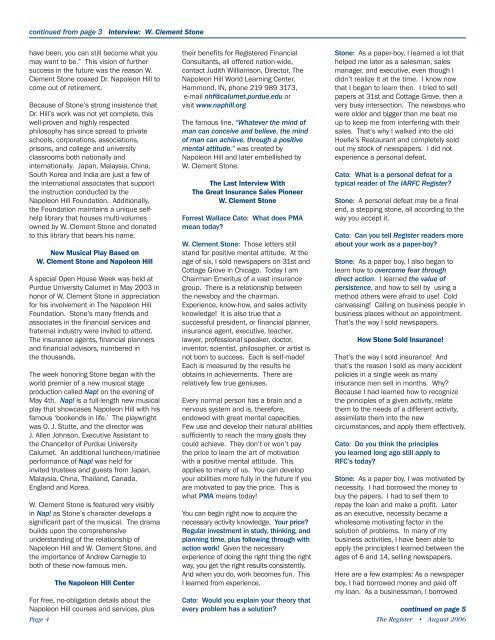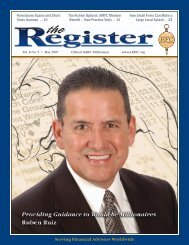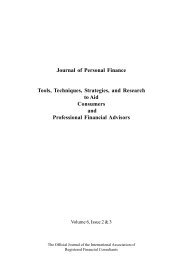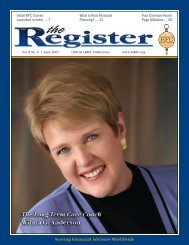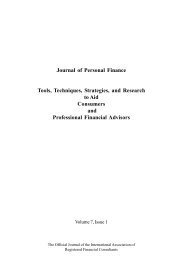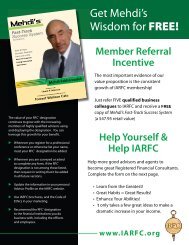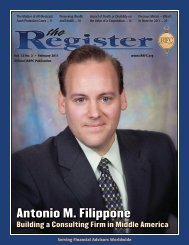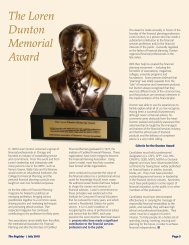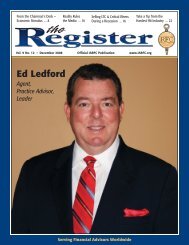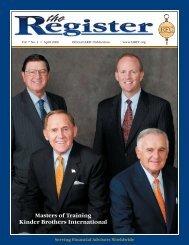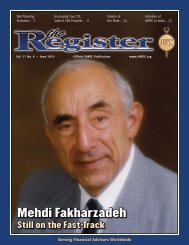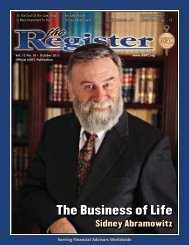Originator: Positive Mental Attitude W. Clement Stone - iarfc
Originator: Positive Mental Attitude W. Clement Stone - iarfc
Originator: Positive Mental Attitude W. Clement Stone - iarfc
You also want an ePaper? Increase the reach of your titles
YUMPU automatically turns print PDFs into web optimized ePapers that Google loves.
continued from page 3 Interview: W. <strong>Clement</strong> <strong>Stone</strong><br />
have been, you can still become what you<br />
may want to be.” This vision of further<br />
success in the future was the reason W.<br />
<strong>Clement</strong> <strong>Stone</strong> coaxed Dr. Napoleon Hill to<br />
come out of retirement.<br />
Because of <strong>Stone</strong>’s strong insistence that<br />
Dr. Hill’s work was not yet complete, this<br />
well-proven and highly respected<br />
philosophy has since spread to private<br />
schools, corporations, associations,<br />
prisons, and college and university<br />
classrooms both nationally and<br />
internationally. Japan, Malaysia, China,<br />
South Korea and India are just a few of<br />
the international associates that support<br />
the instruction conducted by the<br />
Napoleon Hill Foundation. Additionally,<br />
the Foundation maintains a unique selfhelp<br />
library that houses multi-volumes<br />
owned by W. <strong>Clement</strong> <strong>Stone</strong> and donated<br />
to this library that bears his name.<br />
New Musical Play Based on<br />
W. <strong>Clement</strong> <strong>Stone</strong> and Napoleon Hill<br />
A special Open House Week was held at<br />
Purdue University Calumet in May 2003 in<br />
honor of W. <strong>Clement</strong> <strong>Stone</strong> in appreciation<br />
for his involvement in The Napoleon Hill<br />
Foundation. <strong>Stone</strong>’s many friends and<br />
associates in the financial services and<br />
fraternal industry were invited to attend.<br />
The insurance agents, financial planners<br />
and financial advisors, numbered in<br />
the thousands.<br />
The week honoring <strong>Stone</strong> began with the<br />
world premier of a new musical stage<br />
production called Nap! on the evening of<br />
May 4th. Nap! is a full-length new musical<br />
play that showcases Napoleon Hill with his<br />
famous ‘bookends in life.’ The playwright<br />
was O. J. Stutte, and the director was<br />
J. Allen Johnson, Executive Assistant to<br />
the Chancellor of Purdue University<br />
Calumet. An additional luncheon/matinee<br />
performance of Nap! was held for<br />
invited trustees and guests from Japan,<br />
Malaysia, China, Thailand, Canada,<br />
England and Korea.<br />
W. <strong>Clement</strong> <strong>Stone</strong> is featured very visibly<br />
in Nap! as <strong>Stone</strong>’s character develops a<br />
significant part of the musical. The drama<br />
builds upon the comprehensive<br />
understanding of the relationship of<br />
Napoleon Hill and W. <strong>Clement</strong> <strong>Stone</strong>, and<br />
the importance of Andrew Carnegie to<br />
both of these now-famous men.<br />
The Napoleon Hill Center<br />
For free, no-obligation details about the<br />
Napoleon Hill courses and services, plus<br />
their benefits for Registered Financial<br />
Consultants, all offered nation-wide,<br />
contact Judith Williamson, Director, The<br />
Napoleon Hill World Learning Center,<br />
Hammond, IN, phone 219 989 3173,<br />
e-mail nhf@calumet.purdue.edu or<br />
visit www.naphill.org<br />
The famous line, “Whatever the mind of<br />
man can conceive and believe, the mind<br />
of man can achieve, through a positive<br />
mental attitude.” was created by<br />
Napoleon Hill and later embellished by<br />
W. <strong>Clement</strong> <strong>Stone</strong>.<br />
The Last Interview With<br />
The Great Insurance Sales Pioneer<br />
W. <strong>Clement</strong> <strong>Stone</strong><br />
Forrest Wallace Cato: What does PMA<br />
mean today?<br />
W. <strong>Clement</strong> <strong>Stone</strong>: Those letters still<br />
stand for positive mental attitude. At the<br />
age of six, I sold newspapers on 31st and<br />
Cottage Grove in Chicago. Today I am<br />
Chairman Emeritus of a vast insurance<br />
group. There is a relationship between<br />
the newsboy and the chairman.<br />
Experience, know-how, and sales activity<br />
knowledge! It is also true that a<br />
successful president, or financial planner,<br />
insurance agent, executive, teacher,<br />
lawyer, professional speaker, doctor,<br />
inventor, scientist, philosopher, or artist is<br />
not born to success. Each is self-made!<br />
Each is measured by the results he<br />
obtains in achievements. There are<br />
relatively few true geniuses.<br />
Every normal person has a brain and a<br />
nervous system and is, therefore,<br />
endowed with great mental capacities.<br />
Few use and develop their natural abilities<br />
sufficiently to reach the many goals they<br />
could achieve. They don’t or won’t pay<br />
the price to learn the art of motivation<br />
with a positive mental attitude. This<br />
applies to many of us. You can develop<br />
your abilities more fully in the future if you<br />
are motivated to pay the price. This is<br />
what PMA means today!<br />
You can begin right now to acquire the<br />
necessary activity knowledge. Your price?<br />
Regular investment in study, thinking, and<br />
planning time, plus following through with<br />
action work! Given the necessary<br />
experience of doing the right thing the right<br />
way, you get the right results consistently.<br />
And when you do, work becomes fun. This<br />
I learned from experience.<br />
Cato: Would you explain your theory that<br />
every problem has a solution?<br />
<strong>Stone</strong>: As a paper-boy, I learned a lot that<br />
helped me later as a salesman, sales<br />
manager, and executive, even though I<br />
didn’t realize it at the time. I know now<br />
that I began to learn then. I tried to sell<br />
papers at 31st and Cottage Grove, then a<br />
very busy intersection. The newsboys who<br />
were older and bigger than me beat me<br />
up to keep me from interfering with their<br />
sales. That’s why I walked into the old<br />
Hoelle’s Restaurant and completely sold<br />
out my stock of newspapers. I did not<br />
experience a personal defeat.<br />
Cato: What is a personal defeat for a<br />
typical reader of The IARFC Register?<br />
<strong>Stone</strong>: A personal defeat may be a final<br />
end, a stepping stone, all according to the<br />
way you accept it.<br />
Cato: Can you tell Register readers more<br />
about your work as a paper-boy?<br />
<strong>Stone</strong>: As a paper boy, I also began to<br />
learn how to overcome fear through<br />
direct action. I learned the value of<br />
persistence, and how to sell by using a<br />
method others were afraid to use! Cold<br />
canvassing! Calling on business people in<br />
business places without an appointment.<br />
That’s the way I sold newspapers.<br />
How <strong>Stone</strong> Sold Insurance!<br />
That’s the way I sold insurance! And<br />
that’s the reason I sold as many accident<br />
policies in a single week as many<br />
insurance men sell in months. Why?<br />
Because I had learned how to recognize<br />
the principles of a given activity, relate<br />
them to the needs of a different activity,<br />
assimilate them into the new<br />
circumstances, and apply them effectively.<br />
Cato: Do you think the principles<br />
you learned long ago still apply to<br />
RFC’s today?<br />
<strong>Stone</strong>: As a paper boy, I was motivated by<br />
necessity. I had borrowed the money to<br />
buy the papers. I had to sell them to<br />
repay the loan and make a profit. Later<br />
as an executive, necessity became a<br />
wholesome motivating factor in the<br />
solution of problems. In many of my<br />
business activities, I have been able to<br />
apply the principles I learned between the<br />
ages of 6 and 14, selling newspapers.<br />
Here are a few examples: As a newspaper<br />
boy, I had borrowed money and paid off<br />
my loan. As a businessman, I borrowed<br />
continued on page 5<br />
Page 4 The Register • August 2006


